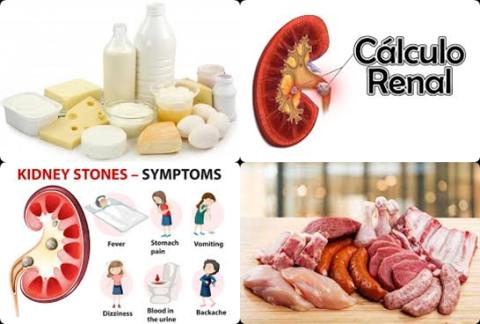
Objectives:
What is the association of total protein, animal protein and animal protein sources with risk of kidney stones in the general population?
Study design:
This review article included 14 prospective cohort studies.
According to NutriGrade scoring system, the credibility of evidence for most of the exposures was rated as low.
Some kind of publication bias was found in the association of animal protein intake and risk of kidney stones, according to Egger's and Begg's tests.
Sensitivity analysis of processed meat as well as dairy consumption with risk of kidney stones showed one study changed the overall estimate.
Results and conclusions:
The investigators found that higher dietary intake of non-dairy animal protein significantly increased risk of kidney stones with 11% [RR = 1.11, 95% CI = 1.03 to 1.20, I2 = 0%, n = 4].
Significant means that there is an association with a 95% confidence.
The investigators found that higher dietary intake of total meat and meat products significantly increased risk of kidney stones with 22% [RR = 1.22, 95% CI = 1.09 to 1.38, I2 = 13%, n = 3].
Significant because RR of 1 was not found in the 95% CI of 1.09 to 1.38. RR of 1 means no risk/association.
The investigators found that higher dietary intake of processed meat significantly increased risk of kidney stones with 22% [RR = 1.22, 95% CI = 1.10 to 1.51, I2 = 0%, n = 2].
The investigators found that higher intake of dairy protein significantly decreased risk of kidney stones with 9% [RR = 0.91, 95% CI = 0.84 to 0.99, I2 = 0%, n = 4].
The investigators found, moreover, each 100 gram increment of red meat dietary intake was significantly associated with an increased risk of 39% for kidney stones [RR = 1.39, 95% CI = 1.13 to 1.71].
The investigators concluded that higher dietary intake of meat and meat products may increase the risk of kidney stones in the general population, while higher dietary intake of dairy proteins may decrease the risk of kidney stones in the general population. May because the credibility of evidence for most of the exposures was rated as low and there was publication bias. Therefore, further observational studies are needed to confirm present results.
Original title:
Associations of Total Protein or Animal Protein Intake and Animal Protein Sources with Risk of Kidney Stones: A Systematic Review and Dose-Response Meta-Analysis by Asoudeh F, Talebi S, […], Mohammadi H.
Link:
https://pubmed.ncbi.nlm.nih.gov/35179185/
Additional information of El Mondo:
Find here more information/studies about RCTs/significant, meat and dairy consumption.
When the credibility of evidence of the studies in the review article is low and there is publication bias, the results will not be very reliable.